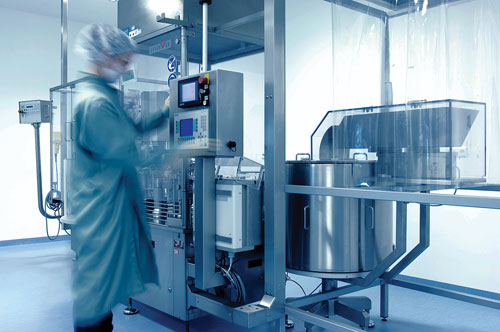March 15, 2014 (Vol. 34, No. 6)
Gail Dutton
New Kits and Workflow Solutions Aim to “Translate Technology into Possibility”
Qiagen has built a strong position in the personalized healthcare space in the past few years, using its portfolio of more than 35 tests and its relationships with academia, leading biopharmaceutical companies, and early-stage innovators as its foundation.
With next-generation sequencing on the rise and regulatory and reimbursement landscapes in flux, Qiagen recognized the need for a new paradigm, one that would transform the corporation. The transformation began in 2009 with the acquisition of DxS.
“Instantly, Qiagen became the biggest independent player in the field of companion diagnostics development,” notes Helge Lubenow, Ph.D., senior vp of Qiagen’s molecular diagnostics business. “Today, Qiagen’s companion diagnostics franchise is growing at a double-digit rate and nets more than $100 million in annual sales.” Dr. Lubenow attributes part of that success to the ability to work with big pharma “through the entire continuum, from early discovery through global commercialization—something few companies can do.”

Qiagen works with manufacturing partners to help them leverage the company’s sample and assay technologies as part of their own offerings. In this image, enzyme filling is carried out in a bioproduction application.
Collaborations
The company has “more than 15 active, mostly global collaborations with major players and mid-sized biotech companies (including Amgen, AstraZeneca, Bayer, Boehringer Ingelheim, Bristol-Myers Squibb, Eli Lilly and Pfizer).” Importantly, Qiagen engages with these partners regularly, discussing very early work as well as late-stage projects. “More and more, we are seeing partnerships that are based on multiyear framework agreements,” Dr. Lubenow says.
“They are the groundwork for potential future projects and enable significant efficiencies by standardizing interfaces and processes between the partnering organizations,” she adds. Communications include R&D summits and strategy sessions to apprise partners of advanced technologies and to keep Qiagen attuned to biopharma concerns. Such relationships led to the launch of the therascreen KRAS test for colorectal cancer in 2012 and the therascreen EGFR test for non-small cell lung cancer in 2013,” Dr. Lubenow points out.
Recent Initiatives
Most recently Qiagen submitted the full QIAsymphony automation system to the FDA for 510(k) clearance, together with a test for Clostridium difficile, the first assay of its emerging healthcare-associated infections (HAI) portfolio. Qiagen aims to increase the cumulative installed base of QIAsymphony from more than 1,000 in 2013 to more than 1,250 in 2014.
“The FDA has identified diagnostic biomarkers for more than 130 existing drugs, and approximately 20 companion diagnostics have been approved,” Dr. Lubenow states. As scientific knowledge grows, those numbers will increase, and the numbers of Qiagen’s personalized medicine products will increase along with them. “Expansion is under active discussion, especially for chronic diseases and for targeted therapies that require patient certification or monitoring of testing, such as chromosomal diseases and autoimmune disease.”
Evolving Demands
During the past decade, regulatory focus has shifted from technical validation to efficiency surrounding patient management, Dr. Lubenow points out. “This is a different way to look at products and the industry, and has caused Qiagen to define products based upon unmet needs.”
For example, KRAS testing along could save the United States more than $600 million annually. Initially, “We experienced uncertainties in the United States around reimbursement,” she says. After proving the value of the test, “we now see adequate premium levels for our validated PMA kits.”
Significant impetus for applications in personalized health is coming from next-generation sequencing technologies, which have become faster and less expensive. Although they are moving into clinical use, “they are impeded by the critical lack of standardization, automation, and flexibility, as well as by the complexity of the subsequent data analysis and interpretation,” Dr. Lubenow remarks.
“Our focus is on developing integrated benchtop solutions,” Dr. Lubenow explains. A next-generation sequencing workflow is being launched that includes “a whole suite of universal solutions that can be used with other next-generation sequencing platforms.”
“We’re also planning to introduce our own sequencer, the GeneReader, later this year,” adds Dr. Lubenow. It will, she says, enable a seamless workflow from the primary patient sample through a clinical report.
The GeneReader sequencer is designed especially for nonexperts at hospitals and smaller reference labs. This approach, asserts Dr. Lubenow, should “reduce complexity and make the systems as easy to use as possible for labs whose workers are skilled in diagnostics but not in next-generation sequencing.”
“This approach exemplifies what we’ve done the past 25 years—translate technology into possibility,” Dr. Lubenow concludes. By including bioinformatics in its focus, Qiagen will facilitate data interpretation by the lab and the physician, thus streamlining the process and driving the adoption of next-generation sequencing into the patient care routine.
Qiagen
Location: Qiagen Strasse 1, 40724 Hilden, Germany
Phone: +49 02103-29-0
Website: www.qiagen.com
Principal: Peer M. Schatz, CEO and Managing Director
Number of Employees: 4,100
Focus: Qiagen is a tools and technology company with a strong presence in molecular sample and assay technologies for pharmaceutical development and patient care. Molecular diagnostics account for nearly 50% of Qiagen’s business.







